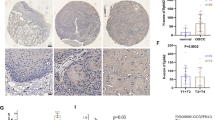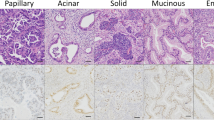Abstract
The objective of this study was to investigate the mechanism of midazolam in inhibiting the proliferation of hypopharyngeal squamous carcinoma cells. Cultured FaDu cancer cells were treated with different concentrations of midazolam. MTT and BrdU incorporation assays were then used to evaluate cancer cell proliferation. The mRNA and protein levels of p300, a key factor involved in the tumorigenesis of numerous cancers, were measured with RT-PCR and Western blotting, respectively. Midazolam inhibited the expression of p300 and the proliferation of FaDu cells. Additionally, knockdown of p300 resulted in increased expression of p21 and p27 and decreased expression of p-Rb while inhibiting the proliferation of FaDu cells. Midazolam inhibits the proliferation of human head and neck squamous carcinoma cells by downregulating p300. Midazolam may be useful for the treatment of hypopharyngeal squamous cancers.




Similar content being viewed by others
References
Hunter KD, Parkinson EK, Harrison PR. Profiling early head and neck cancer. Nat Rev Cancer. 2005;5(2):127–35. doi:10.1038/nrc1549.
Leong PL, ** S, Drenning SD, Dyer KF, Wentzel AL, Lerner EC, et al. Differential function of STAT5 isoforms in head and neck cancer growth control. Oncogene. 2002;21(18):2846–53. doi:10.1038/sj.onc.1205385.
Fan GK, Fujieda S, Sunaga H, Tsuzuki H, Ito N, Saito H. Expression of protein p27 is associated with progression and prognosis in laryngeal cancer. Laryngoscope. 1999;109(5):815–20.
Yuen PW, Man M, Lam KY, Kwong YL. Clinicopathological significance of p16 gene expression in the surgical treatment of head and neck squamous cell carcinomas. J Clin Pathol. 2002;55(1):58–60.
Pavelic K, Krizanac S, Cacev T, Hadzija MP, Radosevic S, Crnic I, et al. Aberration of FHIT gene is associated with increased tumor proliferation and decreased apoptosis-clinical evidence in lung and head and neck carcinomas. Mol Med (Camb, Mass). 2001;7(7):442–53.
Jemal A, Bray F, Center MM, Ferlay J, Ward E, Forman D. Global cancer statistics. CA Cancer J Clin. 2011;61(2):69–90. doi:10.3322/caac.20107.
Parkin DM, Pisani P, Ferlay J. Global cancer statistics. CA Cancer J Clin. 1999;49(1):33–64. 1.
Nordt SP, Clark RF. Midazolam: a review of therapeutic uses and toxicity. J Emerg Med. 1997;15(3):357–65.
Dundee JW, Halliday NJ, Harper KW, Brogden RN. Midazolam. A review of its pharmacological properties and therapeutic use. Drugs. 1984;28(6):519–43.
Kundu TK, Palhan VB, Wang Z, An W, Cole PA, Roeder RG. Activator-dependent transcription from chromatin in vitro involving targeted histone acetylation by p300. Mol Cell. 2000;6(3):551–61.
Vo N, Goodman RH. CREB-binding protein and p300 in transcriptional regulation. J Biol Chem. 2001;276(17):13505–8. doi:10.1074/jbc.R000025200.
Goodman RH, Smolik S. CBP/p300 in cell growth, transformation, and development. Genes Dev. 2000;14(13):1553–77.
Muraoka M, Konishi M, Kikuchi-Yanoshita R, Tanaka K, Shitara N, Chong JM, et al. p300 gene alterations in colorectal and gastric carcinomas. Oncogene. 1996;12(7):1565–9.
Gayther SA, Batley SJ, Linger L, Bannister A, Thorpe K, Chin SF, et al. Mutations truncating the EP300 acetylase in human cancers. Nat Genet. 2000;24(3):300–3. doi:10.1038/73536.
Fan S, Ma YX, Wang C, Yuan RQ, Meng Q, Wang JA, et al. p300 Modulates the BRCA1 inhibition of estrogen receptor activity. Cancer Res. 2002;62(1):141–51.
Bandyopadhyay D, Okan NA, Bales E, Nascimento L, Cole PA, Medrano EE. Down-regulation of p300/CBP histone acetyltransferase activates a senescence checkpoint in human melanocytes. Cancer Res. 2002;62(21):6231–9.
Li M, Luo RZ, Chen JW, Cao Y, Lu JB, He JH, et al. High expression of transcriptional coactivator p300 correlates with aggressive features and poor prognosis of hepatocellular carcinoma. J Transl Med. 2011;9:5. doi:10.1186/1479-5876-9-5.
Vleugel MM, Shvarts D, van der Wall E, van Diest PJ. p300 and p53 levels determine activation of HIF-1 downstream targets in invasive breast cancer. Hum Pathol. 2006;37(8):1085–92. doi:10.1016/j.humpath.2006.03.015.
Debes JD, Sebo TJ, Lohse CM, Murphy LM, Haugen DA, Tindall DJ. p300 in prostate cancer proliferation and progression. Cancer Res. 2003;63(22):7638–40.
**e X, Piao L, Bullock BN, Smith A, Su T, Zhang M, et al. Targeting HPV16 E6-p300 interaction reactivates p53 and inhibits the tumorigenicity of HPV-positive head and neck squamous cell carcinoma. Oncogene. 2013. doi:10.1038/onc.2013.25.
Arain MR, Buggy DJ. Anaesthesia for cancer patients. Curr Opin Anaesthesiol. 2007;20(3):247–53. doi:10.1097/ACO.0b013e32814f1c34.
Acknowledgments
We thank the staff at Forevergen Biosciences for their assistance with experiments and valuable input. We are grateful to the 91SCI Company for language editing assistance. The financial support of this work was from Department of Health of Jiangxi Province (Grant No. 20061130).
Conflicts of interest
None
Author information
Authors and Affiliations
Corresponding authors
Additional information
Yunling Dou, Jia** Lin and Feng-en Lin contributed equally to this article.
Rights and permissions
About this article
Cite this article
Dou, Yl., Lin, Jp., Liu, Fe. et al. Midazolam inhibits the proliferation of human head and neck squamous carcinoma cells by downregulating p300 expression. Tumor Biol. 35, 7499–7504 (2014). https://doi.org/10.1007/s13277-014-1991-0
Received:
Accepted:
Published:
Issue Date:
DOI: https://doi.org/10.1007/s13277-014-1991-0




